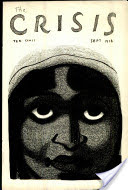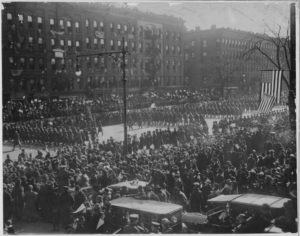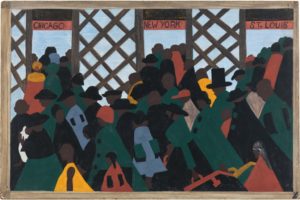By Courtney C. Hobson, Program Assistant for Chautauqua
In selecting our Chautauqua characters for our 23rd season, we wanted a historical figure that could encapsulate the African-American experience during the First World War. While not serving in the military himself, W.E.B. Du Bois used the outbreak of war in Europe and the United States’ entry in 1917 to speak out against discrimination that African Americans experienced on the home front.

Working as editor of the National Advancement for Colored People’s journal, The Crisis, Du Bois used his platform to speak his mind on many national and international issues in the years leading up and during the war. Despite his disappointment in President Woodrow Wilson’s failure to uphold his campaign promise to integrate the federal workforce, Du Bois saw the United States’ entry into World War I as an opportunity to correct this error and to re-shape post-war American society:
“The Crisis says, first your Country, then your Rights! Certain honest thinkers among us hesitate at that last sentence. They say it is all well to be idealistic, but is it not true that while we have fought our country’s battles for one hundred fifty years, we have not gained our rights? No, we have gained them rapidly and effectively by our loyalty in time of trial.” —W.E.B. DuBois [1]
Despite the enlistment of hundreds of thousands of African American men, particularly those who were college-educated, the United States Armed Forces remained segregated.
The majority of African Americans worked in a labor capacity, completing such tasks as digging ditches and transporting supplies. However, some African Americans did take part in combat. The most famous fighting unit was the 369th Infantry Regiment. Most people know them by their nickname, the Harlem Hellfighters. This name was given to the regiment by the German forces due to their performance in combat. Two soldiers of the regiment, Henry Johnson and Needham Roberts, were the first American soldiers to receive the French Croix de Guerre (War Cross).

After the war ended in November 1918, African American soldiers returned home with the hope that their service overseas would have a positive impact on race relations back home. In February 1919, the Harlem Hellfighters were welcomed by a large crowd with a parade up Fifth Avenue and into Harlem. Even Du Bois expressed optimism in the May 1919 issue of the Crisis:“We return. We return from fighting. We return fighting. Make way for Democracy! We saved it in France, and by the Great Jehovah, we will save it in the United States of America, or know the reason why.”[2] However, the optimism would soon give way to the realities of American society.
The end of World War I marked the beginning of the Great Migration, which was the movement of over 5 million African Americans from rural areas to industrial cities from 1915 until 1970. The return of soldiers from Europe led to increased competition for employment and housing. Economic insecurity and racial prejudice boiled over in the summer of 1919, during which over thirty cities erupted into racial violence. In most cases, African Americans were attacked, although in some instances, notably in Chicago, they fought back.[3] Over 150 people were killed and over 550 were injured. Eleven of those killed were men wearing their service uniform.
“The Red Summer of 1919 broke in fury. The colored people throughout the country were disheartened and dismayed. The great majority had trustingly felt that, because they had cheerfully done their bit in the war, conditions for them would be better. The reverse seemed to be true.” – James Weldon Johnson, Civil Rights activist and author.[4]

[1] W.E.B. Du Bois, “Editorial,” The Crisis 16, no. 5 (Sept. 1918): 217.
[2] W.E.B. Du Bois, “Returning Soldier,” The Crisis 18 (May 1919): 13.
[3] Rebecca Onion, “Red Summer,” Slate, entry posted March 4, 2015, http://www.slate.com/articles/news_and_politics/history/2015/03/civil_rights_movement_history_the_long_tradition_of_black_americans_taking.html/ (Accessed January 31, 2017).
[4] James Weldon Johnson, Along This Way (Boston, MA: Da Capo Press, 1933), 241.

